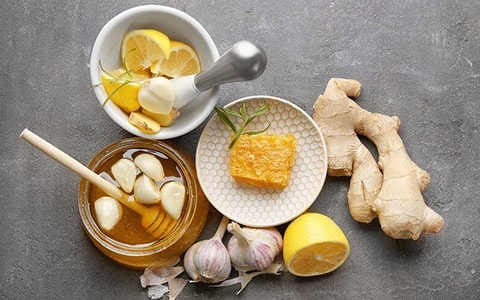Tea-rrific Benefits: How Green and Black Tea Improve Health
From Heart Health to Diabetes Prevention: Unleashing the Health Benefits of Green and Black Tea
R E A D : The Healing Brew A Comprehensive Guide to the Health Benefits of Tea
>> Tea has been shown to have several potential health benefits, including the potential to lower blood sugar and high blood pressure. However, the effectiveness of tea in reducing these conditions can vary depending on several factors, such as the type of tea, the quantity consumed, and the individual's overall health.
Research has suggested that certain types of tea, particularly green tea, may help to lower blood sugar levels and reduce the risk of type 2 diabetes. Green tea contains compounds called catechins, which may help to improve insulin sensitivity and regulate blood sugar levels.
In addition, some studies have also found that drinking tea, particularly black tea, may help to reduce blood pressure levels. The flavonoids found in tea may help to improve blood vessel function and reduce inflammation, which can contribute to lower blood pressure.
While tea can be a potentially beneficial addition to a healthy diet and lifestyle, it is important to note that it should not be used as a sole treatment for conditions such as high blood sugar or high blood pressure. It is always important to consult with a healthcare provider before making any significant changes to your diet or exercise routine, particularly if you have any pre-existing health conditions.
 |
| Tea Boosting Health with Green and Black Tea. Health news // Lybrate |
* Green tea
Green tea is a type of tea made from the leaves of the Camellia sinensis plant, which is native to China and other parts of East Asia. It is one of the least processed types of tea, and is made by steaming or pan-frying the leaves, which helps to preserve their natural flavor and nutrients.
Green tea is rich in antioxidants known as catechins, which have been shown to have a variety of potential health benefits. These compounds may help to reduce inflammation, improve heart health, and lower the risk of certain types of cancer.
In addition to its potential health benefits, green tea is also a popular beverage enjoyed around the world for its unique flavor and aroma. It can be enjoyed hot or cold, and is often brewed with additional flavors such as mint, lemon, or ginger.
It is important to note that while green tea can be a potentially healthy addition to a balanced diet and lifestyle, it should not be relied on as a sole treatment for any specific health condition. As with any dietary changes, it is important to consult with a healthcare provider before making any significant changes to your diet or exercise routine.
> Here are some general guidelines for consuming green tea
>> Choose high-quality green tea: Look for high-quality loose-leaf green tea, or tea bags that contain full leaves, as opposed to lower-quality tea dust or fannings.
>> Brew with hot water: Green tea should be brewed with hot, but not boiling water (about 175-185°F or 80-85°C) to prevent the delicate tea leaves from becoming too bitter.
>> Steep for 1-3 minutes: Steep the green tea for 1-3 minutes, depending on your preference for strength. Do not over-steep the tea, as this can cause it to become too bitter.
>> Enjoy plain or with a touch of honey or lemon: Green tea can be enjoyed plain or with a touch of honey or lemon to add flavor.
>> Drink 2-3 cups per day: Drinking 2-3 cups of green tea per day may provide potential health benefits.
>> Be mindful of caffeine intake: Green tea naturally contains caffeine, so be mindful of your total caffeine intake if you are sensitive to caffeine or have any pre-existing health conditions.
>> Consult with a healthcare provider: If you have any pre-existing health conditions or concerns, it is always best to consult with a healthcare provider before making any significant changes to your diet or lifestyle.
> To the guidelines mentioned above, here are some other tips for consuming green tea
>> Choose organic green tea: Choosing organic green tea can help to reduce your exposure to harmful pesticides and chemicals.
>> Store properly: To preserve the freshness and flavor of green tea, store it in an airtight container away from light, heat, and moisture.
>> Experiment with different varieties: There are many different types of green tea available, each with its own unique flavor and aroma. Experiment with different varieties to find the ones you enjoy the most.
>> Consider matcha: Matcha is a type of powdered green tea that is made by grinding whole green tea leaves into a fine powder. It is often used in traditional Japanese tea ceremonies and has become increasingly popular in recent years due to its potential health benefits and unique flavor.
>> Don't add milk: Unlike black tea, which is often consumed with milk and sugar, green tea is traditionally consumed plain or with a touch of honey or lemon. Adding milk to green tea can detract from its delicate flavor and may also reduce its potential health benefits.
Remember that while green tea may offer potential health benefits, it should not be relied on as a sole treatment for any specific health condition. It is always important to consult with a healthcare provider before making any significant changes to your diet or exercise routine, particularly if you have any pre-existing health conditions.
 |
| Tea Boosting Health with Green and Black Tea, Health news // Lybrate |
R E A D : Exploring the Health Benefits of Pomegranate A Superfood for Optimal Wellness
* Black tea
Black tea is a type of tea that is more oxidized than green, oolong, and white teas. It is made from the leaves of the Camellia sinensis plant, which are withered, rolled, and then fully oxidized before they are dried and packaged.
Black tea has a strong, robust flavor and is often consumed with milk and sugar. It is a popular beverage around the world, particularly in countries such as India, the United Kingdom, and Ireland.
Like green tea, black tea is also rich in antioxidants, which may help to reduce inflammation, improve heart health, and lower the risk of certain types of cancer. In addition, black tea may also help to improve mental alertness and focus, due to its natural caffeine content.
However, it is important to note that consuming excessive amounts of black tea (or any caffeinated beverage) can lead to negative health effects such as jitteriness, anxiety, and difficulty sleeping. As with any dietary changes, it is important to consume black tea in moderation as part of a balanced diet and lifestyle.
> Here are some general guidelines for consuming black tea
>> Choose high-quality black tea: Look for high-quality loose-leaf black tea or tea bags that contain full leaves, as opposed to lower-quality tea dust or fannings.
>> Brew with boiling water: Black tea should be brewed with boiling water (about 212°F or 100°C) to release its full flavor.
>> Steep for 3-5 minutes: Steep the black tea for 3-5 minutes, depending on your preference for strength. Do not over-steep the tea, as this can cause it to become too bitter.
>> Enjoy plain or with milk and sugar: Black tea can be enjoyed plain or with a touch of milk and sugar to add flavor. This is particularly popular in countries such as the United Kingdom and Ireland, where "tea with milk" is a common beverage.
>> Drink in moderation: As with any caffeinated beverage, it is important to consume black tea in moderation. Drinking too much black tea (or any caffeinated beverage) can lead to negative health effects such as jitteriness, anxiety, and difficulty sleeping.
>> Consult with a healthcare provider: If you have any pre-existing health conditions or concerns, it is always best to consult with a healthcare provider before making any significant changes to your diet or lifestyle.
Remember that while black tea may offer potential health benefits, it should not be relied on as a sole treatment for any specific health condition. It is always important to consume black tea as part of a balanced diet and lifestyle, and to consult with a healthcare provider if you have any pre-existing health conditions or concerns.
R E A D : Blueberries The Magical Fruit that Improves Health from the Inside and the Outside
> Here are some additional tips for consuming black tea
>> Experiment with different varieties: There are many different types of black tea available, each with its own unique flavor and aroma. Experiment with different varieties to find the ones you enjoy the most.
>> Try brewing with loose-leaf tea: Brewing black tea with loose-leaf tea instead of tea bags can offer a richer, more complex flavor.
>> Don't add lemon: Unlike green tea, which is often consumed with a touch of lemon, black tea should not be consumed with lemon. The acid in lemon can cause the milk to curdle and the tea to become bitter.
>> Enjoy with food: Black tea is often consumed with food, particularly in cultures such as India and China. It can be a refreshing and palate-cleansing beverage to enjoy alongside a meal.
>> Be mindful of caffeine intake: Black tea naturally contains caffeine, so be mindful of your total caffeine intake if you are sensitive to caffeine or have any pre-existing health conditions.
Remember to consume black tea in moderation as part of a balanced diet and lifestyle. If you have any pre-existing health conditions or concerns, it is always best to consult with a healthcare provider before making any significant changes to your diet or lifestyle.
:max_bytes(150000):strip_icc()/GettyImages-1344984510-e8f3dfb765724628800858096c98cdc6.jpg) |
| Tea Boosting Health with Green and Black Tea. Health news // Verywell Health |
Both green tea and black tea can offer potential health benefits when consumed as part of a balanced diet and lifestyle. Green tea has been associated with a lower risk of cardiovascular disease, type 2 diabetes, and certain types of cancer, while black tea has been linked to improved cardiovascular health and reduced risk of stroke.
When consuming green tea, it is best to choose high-quality loose-leaf tea or tea bags, and brew with water that has been heated to 160-180°F (70-82°C). When consuming black tea, choose high-quality loose-leaf tea or tea bags, and brew with boiling water for 3-5 minutes. Black tea can be enjoyed plain or with a touch of milk and sugar, while green tea is traditionally consumed plain or with a touch of honey or lemon.
Remember to consume both green tea and black tea in moderation and as part of a balanced diet and lifestyle. It is also important to consult with a healthcare provider before making any significant changes to your diet or lifestyle, particularly if you have any pre-existing health conditions or concerns.
R E A D :
- Beet Your Way to Better Health: Unleashing the Nutritional Power of Beets
- Chia Seeds The Nutrient-Dense Superfood for Improved Health and Wellness
- Exploring the Health Benefits of Pomegranate A Superfood for Optimal Wellness
- Dietary Changes for Lower Blood Pressure: 10 Best Habits Recommended by Dietitians
- Sleep Better, Live Longer How These 5 Habits Can Add 5 Years to Your Life!
- Type 2 Diabetes Mellitus Causes, Symptoms, Treatment, and Prevention








)

